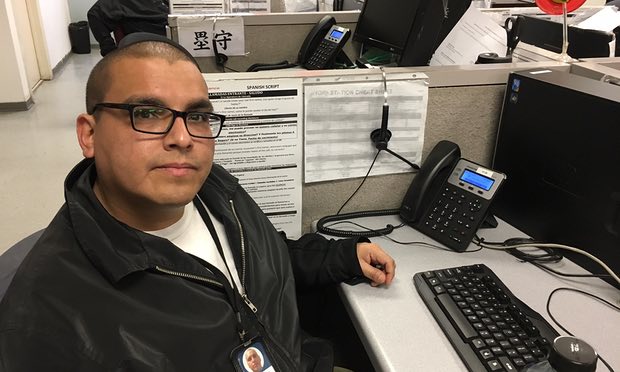Mexico call centers await ‘huge pool of talent’ if Trump keeps deportation pledge


If Donald Trump deports millions of people, Mexico’s call centers will have one word for him – and it won’t be gracias; it’ll be thanks.
The booming industry needs English speakers to service US customers, and the US president seems set to oblige with a deportation force that could banish record numbers of Americanized Mexicans south of the border.
“That’s a huge pool of talent for us,” said Joe Andere, executive vice-president of Americas Survey Company (ASC), which with its sister company Voxcentrix has 450 call center stations in Tijuana. “We’re looking for people at the moment. All the companies are.”
Employing native English speakers who understand American culture gives Mexican call centers an edge over rivals in India and the Philippines in a competitive, billion-dollar global industry.
Call centers here already employ thousands of people deported under the Obama administration. They do market research, sales and technical support for companies such as McDonald’s, Coca-Cola and Toyota. Their English can be so fluent and idiomatic that customers assume they are in the US.
Luis Vargas Salazar, 53, a former marine deported in 2014 after 51 years in the US, is due to start a call center job this week. “I aced the tests,” he said. “I scored so high on all the English exams they signed me up straight away.”
Call centers post flyers on the noticeboards of migrant shelters where deportees usually spend their first nights after expulsion. The flyers promise dollar commissions, bonuses and benefits, such as free coffee and cookies. Wages, however, are low – about $100 a week.
From just a handful a decade ago, there are now more than 50 call centers employing more than 10,000 people just in Tijuana, a sprawling city abutting a border wall beyond which lies San Diego.
“We’re fighting for the same pool of people so we have to refine our retention strategies. Wages are going up,” Andere said. “The industry is growing every single day.” About 80% of his agents are bilingual – and of those, most were deported.
If Trump keeps a promise to swiftly deport 3 million undocumented people, possibly followed by millions more, it will benefit call centers, the executive said. “Absolutely.”
The upbeat view contrasted with the anxiety gripping immigrant communities around the US. Immigration and Customs Enforcement raids swept up 680 people last week, sparking grassroots resistance and vows to block future deportations.
Mass expulsions could undermine a separate Trump election promise to curb the outsourcing of call center jobs. Seven Democratic senators have lobbied the president to ban federal contractors from offshoring such posts.
Mexico, however, is far cheaper than the US. If the country gets more native English speakers, US corporations will be even more tempted to outsource such work.
Call centers can be a lifeline for deportees who arrive broke, disorientated and disconnected from families in the US. Some of those who left Mexico as infants barely remember the country or speak Spanish.
“Everything was new. It was a new world,” said Oscar Ortega, 47, who left four children behind in Duarte, California. He struggled to adapt to life in Tijuana. “I was used to how the [US] runs things. I didn’t know anything about Mexico.”
Ortega has been a survey supervisor with ASC since 2009. “It’s been my family.” Spending eight hours a day in a cubicle with a headset, talking to strangers across the US, nurtured a connection with his old life. “It makes me feel closer to things over there. I still feel American.”
Jaime Castaneda, 37, was in diapers when his family crossed illegally from Mexico, so being dumped back in 2008 – he was convicted of drug possession – came as a shock. “I was in denial for a while.” He said he enjoys doing customer satisfaction surveys but plans to appeal the deportation next year, when he will have completed a decade out of the US.
Trying to bypass border security was a dumb move likely to end in capture and jail, Castaneda said. “They have drones, infrared. If you’re smart, you get with the program here, do the nine-to-five.”
Some call center agents, however, do attempt to sneak back IGNORE INTO the US, said Ramses St Martin, 32, a supervisor. “Some guys will go missing for a couple of days, trying to cross, then they get caught and deported and show up here again.”
Many deportees committed minor offenses, such as driving under the influence, but some match Trump’s depiction of “bad hombres” – they are men convicted of serious crimes.
Call centers in El Salvador employ so many former gang members they are nicknamed “homieland”, according to the New Yorker.
Salazar, the former marine, spent 14 years in jail for sexual assault. He said he was a born-again Christian who had repented and hoped to return, pardoned and forgiven. Meanwhile, he planned to use his gift of the gab to engage strangers on the phone. “I’m looking forward to it. I like to talk and I like to help people.”
Andere, the executive, said companies vetted employees and banned pen, paper and cellphones from work stations to prevent theft of credit card details and other sensitive information.
Deportees were overwhelmingly honest, dedicated workers, he said. “We were the first to employ people with tattoos. We saw past it. It doesn’t matter how you look. It matters how you sound over the phone.”





